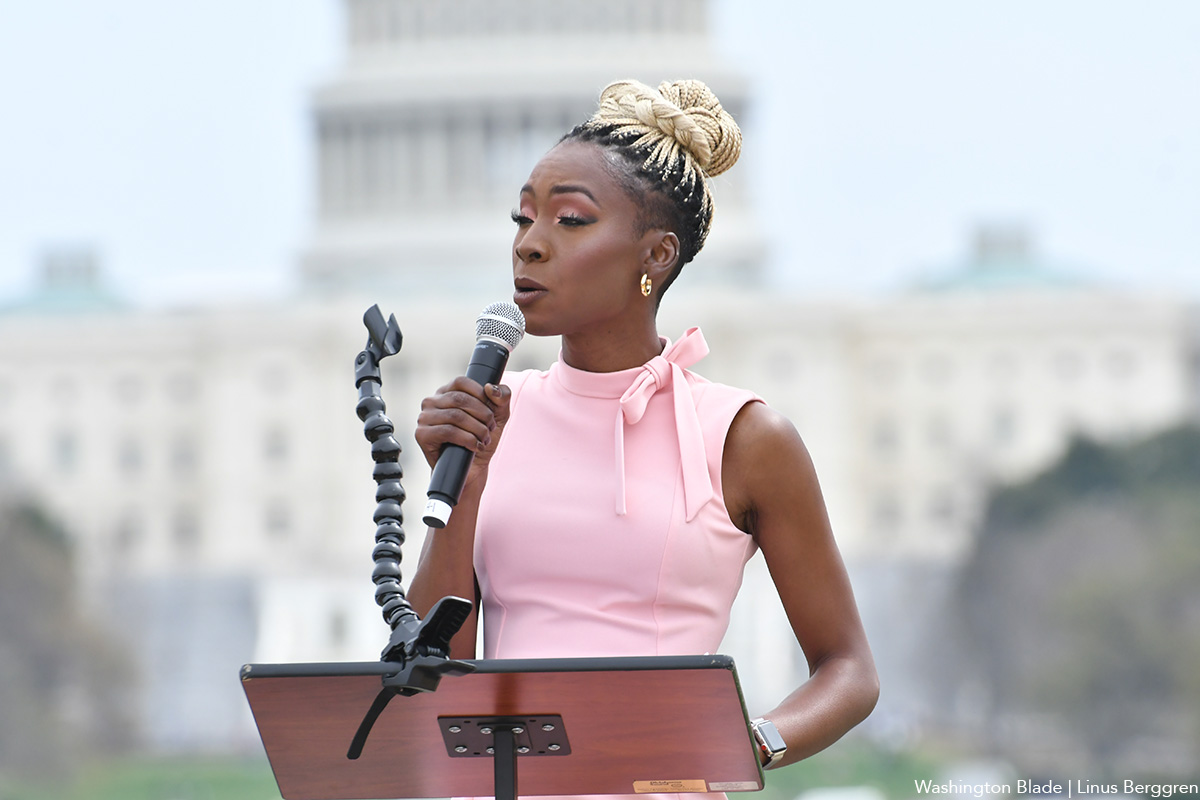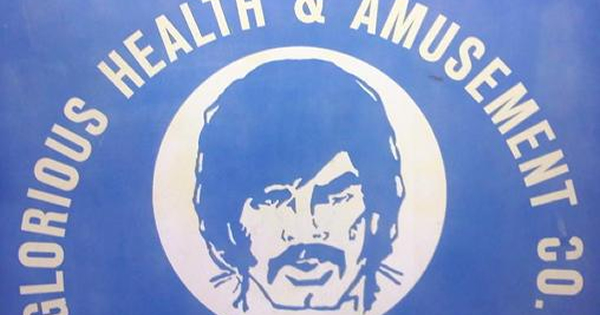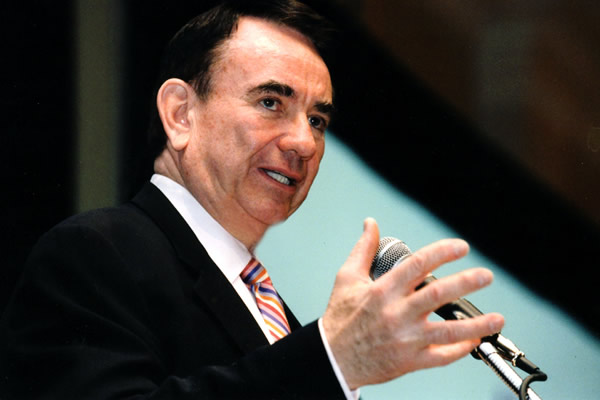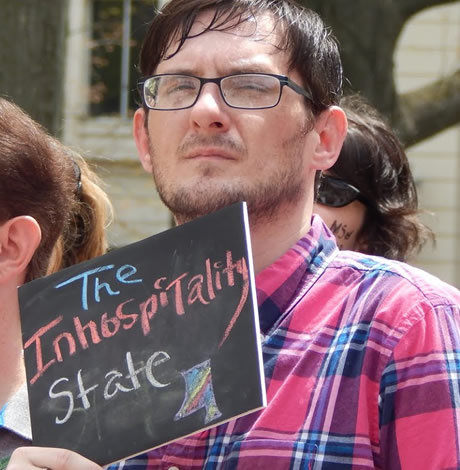National
Meet Baldwin’s opponent: Tommy Thompson
Former Wis. guv wins Republican nomination

The build up over whom lesbian U.S. Senate candidate Tammy Baldwin will face in the general election came to an end Tuesday night when Wisconsin voters gave the GOP nomination to former Gov. Tommy Thompson.
The Associated Press called the election for Thompson at around 11:30 in the evening. According to WisconsinVote.org — a project of Wisconsin Public Radio and Wisconsin Public Television — Thompson had around 34 percent of the vote.
The GOP candidate who came closest was hedge fund manager Eric Hovde, who had 30.9 percent of the vote. Former U.S. Rep. Mark Neumann had 22.8 percent while Wisconsin Assembly Speaker Jeff Fitzgerald had 12.4 percent.
SEE WHO MAY BE FILLING TAMMY BALDWIN’S HOUSE SEAT NEXT YEAR.
On the same night, Baldwin officially claimed the Democratic nomination in her pursuit of the seat that Sen. Herb Kohl (D-Wis.) is vacating at the end of this year, putting her in a position to become the first openly gay person elected to the Senate.
Thompson has a long history of service in public office. He served as Wisconsin’s governor from from 1987 to 2001 and was secretary of health and human services under former President George W. Bush. In 2008, Thompson sought the Republican nomination to run for the White House, but dropped out early in his bid.
Thompson’s victory in the Republican primary is probably the worst outcome for Baldwin because the former governor is popular in his state and was seen as a moderate candidate with the greatest appeal to the mainstream voters. Still, he didn’t have the self-financing capability of Hovde, who funded 92 percent of his campaign with millions of his own money.
In a statement issued on the night of the primary, Baldwin tore into Thompson, saying he’ll “stand with those who already have too much power and influence in Washington.”
“I will fight to do what’s right for the middle class and Thompson will put those at the very top and the big monied special interests in Washington ahead of Wisconsin’s hard working families,” Baldwin said. “I will take on these powerful interests in Washington, and in the Senate, I will stand up for Wisconsin’s middle class, as I always have.”
Among the policies that Baldwin said she’ll push for include a “Made in Wisconsin” manufacturing economy; tax cuts for small business to fuel job creation; ending tax breaks for outsourcing and giving companies tax incentives to create jobs within the United States.
“Tommy Thompson supports the policies of the past,” Baldwin said. “Policies that have failed. Policies from the past that crashed our economy, and got us into our fiscal mess in the first place. He believes we should slash the very investments we need to move our economy forward, in education, innovation, and infrastructure — all while cutting taxes for those at the very top.”
Recent polls have put Baldwin either dead-even with Thompson or him with a single-digit lead. In a CBS/NYT/Quinnipiac poll published last week, Baldwin ties Thompson, 47-47. In a Marquette University poll, Thompson leads Baldwin 48-43.
Still, Baldwin is in good position to take on Thompson in terms of fundraising; she’s nearly trebled the funds the GOP candidate has raised. According to Federal Election Commission reports, Baldwin has $7.1 million in net receipts, $4.7 million in net expenditures and $3.2 million in cash on hand. None of her net receipts are the result of self-financing.
In comparison, Thompson has $2.5 million in net receipts, $2.1 million in net expenditures and $198,000 in cash on hand. Around $133,000, or five percent, of his net receipts are the result of contributions to his own campaign.
The Republican primary fell on the same day that LPAC, the lesbian Super PAC launched by Chicago Cubs co-owner Laura Ricketts, announced it has endorsed Baldwin and would match every dollar that individuals give to her campaign through the Super PAC up to $50,000. That means the group has a goal of raising $100,000 for Baldwin.
Arguably, Thompson was the least opposed to LGBT rights of the four major Republican candidates in the running. During an interview with Wisconsin’s CBS 58 earlier this year, he said marriage should be left to the states and he backs the Defense of Marriage Act, but stopped short of endorsing a Federal Marriage Amendment for the U.S. Constitution.
“I believe very strongly in the Defense of the Marriage Act,” Thompson said. “Marriage is one man and one woman. I support that. That’s the federal law. I’m a little gun shy of people saying, ‘We got to have constitutional amendments for this or that. I happen to like our Constitution, and, I think, you should not be going around amending constitutions.”
During a 2008 Republican presidential debate, Thompson said “yes” when questioned whether employers should be able fire people if they’re gay, but later said he answered the question incorrectly and doesn’t believe in discrimination. Thompson said he backs Wisconsin’s statewide law against discrimination against gays — enacted in 1982 and the first-ever in the country — but stopped short of saying he’d support the Employment Non-Discrimination Act.
“I didn’t hear the question properly and I apologize,” Thompson said. “It’s not my position. There should be no discrimination in the workplace and I have never believed that. And, in fact, Wisconsin has one of the first laws, which I supported.”
As secretary of health and human services, Thompson headed Bush’s domestic effort against HIV/AIDS, renewing the Presidential Advisory Council on HIV/AIDS, announcing approval of rapid testing and directing funds to confront the epidemic. But Thompson also worked for a president who touted abstinence-only education and remained silent on gay men and condoms for much of his administration.
On the other hand, as the first non-incumbent openly gay person elected to the U.S. House, Baldwin not only supported, but has taken the lead on pro-LGBT legislation and helped guide it through Congress. Baldwin voted against the Federal Marriage Amendment in 2004 and 2006. In later years, she voted for hate crimes protections legislation, a sexual orientation-only version of the Employment Non-Discrimination Act and “Don’t Ask, Don’t Tell” repeal.
CORRECTION: An initial version of this article incorrectly referred to Tammy Baldwin as the first openly gay person to have a major party nomination in a bid for a U.S. Senate seat. That distinction actually goes to Ed Flanagan of Vermont, whom the Gay & Lesbian Victory Fund endorsed in 2000. Flanagan lost his bid to incumbent Jim Jeffords, who was a Republican at the time. The Blade regrets the error.

It is common knowledge that women earn 84% of the average worker. Less common knowledge? Trans women earn 60% of the average worker. Trans men and non-binary people come in at around 70%, while 16% of all trans people make less than $10,000 annually.
E.C. Pizarro was lucky, and he knew it. He had a BFA in graphic design and had taught himself how to code. As a stealth trans man in a corporate job, he had access to a stable wage and good benefits. “People that do not have experiences in corporate America or with equitable employment don’t realize [these things] are privileges that a lot of people don’t have access to.”
He wanted to give back and was gearing up to bring more volunteer work into his life by participating in a fraternity for trans men. When he went to a TransTech event and learned about the educational and career resources for trans people who face barriers to entering the workforce, he knew he had found his place.
At the event he met, Angelica Ross. Yes, that Angelica Ross, of “Pose” and “American Horror Story.”
Before she was Candy, Ross was a self-taught coder. She went from posing for an adult website to doing its back-end coding to teaching her trans siblings how to succeed in tech.
“Technology was the key to my freedom,” Ross said in an interview with The Plug. “Technology took me from being exploited on someone’s website to building my own websites and to building websites for other people and getting paid to do so.”
Pizarro was impressed and wanted to help. “I went up to Angelica and I was like ‘Hey, I’m a trans man. These are my skills. I’m down to volunteer and do any type of work—the one caveat is that I’m stealth. You can’t tell anybody that I’m trans.’”
For four years, Pizarro helped from mostly behind the scenes, sometimes getting side-eyed since people thought he was a cis man in trans spaces. “I was still stealth as the Director of Social Media and Communications for the National Trans Visibility March in 2019,” Pizarro says, chuckling a little.
But by that point, Ross — who headlined the 2019 march — was overextended trying to balance being a world-famous actress, advocate, and businesswoman.
She needed someone to step in as executive director of TransTech and looked to the group of dedicated volunteers. Pizarro was elected by his peers to take the reins of the organization.
This was a turning point for Pizarro. “I’m very passionate about tech and for me a small sacrifice of being open with my trans experience to liberate other trans people,” he said. “I felt like if that’s something I got to do, then I’m gonna do it.”
And he did it. The infrastructure Ross put together worked: with mentorship, education, community, and networking with trans-accepting employers, trans people were gaining financial security and independence.
So, Pizarro focused on expanding TransTech as widely as possible. “We have grown exponentially over the last three years,” he says. “When I took over in 2021, we had about 800 members based in the United States. Now we support over 6,700 members across 50 countries.”
TransTech is filling a demonstrated need within specifically the trans community. New research from LGBT Tech found that 68% of transgender adults use the internet to find LGBTQ-friendly employment (compared to 38% of cisgender LGBTQ+ adults). More than 70% of all LGBTQ adults use the Internet to access educational content.
Accessibility is central to the TransTech programming. Despite the growth, everything remains free. “There’s no membership fee. All of our programming is free. All of the certifications and educational resources are free,” Pizarro says.
They know the financial burden the trans community faces — 29% of trans adults live in poverty. “If we’re asking anyone to up-skill [for a cost] and these are the things they are going through, we are asking them to invest in their future versus their meal today.”
Pizarro believes that accessibility is more than just making the training free. He wants the community to understand that tech work is something they are innately capable of doing.
“TransTech was built on the foundation of nontraditional tech. It’s not always coding. It’s graphic design. It’s social media. It’s video editing. It’s anything that uses a piece of technology and nowadays almost everything uses a piece of technology,” says Pizarro.
He emphasizes to participants: “You’re in tech and you don’t even know it,” pointing out how many already utilize tech skills like marketing and monetization with their social media accounts.
Some people involved in the programming are nervous about entering the “tech world” because of headlines about tech layoffs. He makes sure to emphasize that unlike in some other jobs, tech companies often pay generous severance packages, which gives employees “breathing room.” Pizzaro explains that “once you have experience with one tech company, you can go someplace else and make a substantial amount of money as well.”
While TransTech is designed for the gender-diverse community, the programming is open to everyone Pizarro explains. “We just ask that you don’t be transphobic.” (Or any of the other -phobics too, he says, listing them off.) He also emphasizes that this allows trans members who are not out to comfortably participate.
Pizarro wants everyone to understand that they don’t just belong in tech, but they make tech better. “Tech is most profitable when you have diverse people building the tech and using the tech,” Pizarro says. “There is an intentional funding as well as support to diversity tech because they understand how that impacts the product.”
He also reminds participants that they have developed transferrable skills in every part of their lives. “I like to tell people if you can manage your life as a trans person in the United States or anywhere you can manage a project.”

District of Columbia
Fire by arson forced temporary shutdown of Glorious Health Club
Spa and art gallery catering to gay
men expects to reopen in August

In a little noticed development, D.C.’s Glorious Health Club, which bills itself as a spa, art gallery, and community center catering to gay men, was forced to close on May 19 after one or more unidentified suspects ignited a fire inside the club that D.C. fire department officials have ruled an act of arson.
Robert Siegel, the club’s owner, told the Washington Blade that he and investigators with the D.C. Fire and Emergency Medical Services Department believe one or more yet unidentified suspects broke into the kitchen of the former warehouse building where the club is located at 2120 West Virginia Ave., N.E.
According to Siegel, investigators with the fire department’s arson squad believe a flammable liquid was used to start the fire in the kitchen and in two other locations within the building.
“Three separate fires were started,” Siegel said. “They started one on a staircase and one on the upstairs storage area,” he said in addition to the one in the kitchen. He said about 40 patrons were in the club at the time the fire started, and all were able to leave without injury.
Siegel said the fire caused $500,000 worth of damage to his building, with some of the damage caused — understandably he said — by fire fighters who had to rip open doors and break through the roof to gain access to the flames that engulfed parts of the interior of the building. He said he arranged for repair work to begin after the fire was extinguished.
“I expect we’ll be reopening in about a month from now,” he said. “And we’ll be a bigger and better place.”
Fortunately, Siegel said, most of the artwork and art exhibits located in the club were not damaged.
“It was basically the kitchen, patio, and the roof,” he said, adding that much of the solar panels he had on the roof were destroyed by the fire or by firefighters seeking to gain access to the building.
“And the fire was so hot it did structural damage to the roof,” he said. “It actually melted steel. We’re talking about 50-foot steel beams that have to be replaced,” he told the Blade. “That’s $100,000 right there.”
Vito Maggiolo, a spokesperson for the D.C. Fire and Emergency Medical Services Department, said the fire was “ruled incendiary/arson” and is “under active investigation.”
It could not immediately be determined if one or more people responsible for the fire targeted the Glorious Health Club because it’s a gay community establishment.
National
House Republicans propose steep cuts in federal AIDS budget
Advocacy groups say move would eliminate ‘Ending HIV Epidemic’ initiative

The Republican-controlled U.S. House Subcommittee on Labor, Health, and Human Services, Education, and Related Agencies approved a spending bill on June 26 that calls for cutting at least $419 million from federal AIDS programs that AIDS activists say would have a devastating impact on efforts to greatly reduce the number of new HIV infections by 2030.
The subcommittee’s proposed bill, which includes billions of dollars in cuts in a wide range of other federal health, education, and human services related programs, is scheduled to be considered by the full House Appropriations Committee on July 10. Officials with AIDS advocacy groups say they are hopeful that the full committee, like last year, will refuse to approve the proposed cuts in the AIDS budget.
The proposed GOP cuts would eliminate $214 million from the U.S. Centers for Disease Control and Prevention’s HIV prevention programs, $190 million from the Ryan White HIV/AIDS Program, and $15 million from the Department of Health and Human Services Secretary’s Minority HIV/AIDS Program.
Activists say the impact of those cuts would kill the federal government’s Ending the HIV Epidemic initiative, which among other things, calls for reducing the number of new HIV infections in the U.S. by 75 percent by 2025 and by 90 percent by 2030. The activists point out that ironically the Ending the HIV Epidemic initiative was launched during the administration of President Donald Trump.
“Instead of providing new investments in ending HIV by increasing funding for testing, prevention programs, such as PrEP, and life-saving care and treatment, House Republicans are again choosing to go through a worthless exercise of cutting programs that the American people depend on and will never pass,” said Carl Schmid, executive director of the HIV + Hepatitis Policy Institute.
“While we vigorously fight these cuts, we look forward to working with the entire Congress in a bipartisan fashion on spending bills that can actually become law,” Schmid said in a statement.
Schmid noted that the bill also includes provisions known as “policy riders” that would take away rights and protections from women, such as access to birth control and abortion, and for minorities, including LGBTQ people.
According to a statement released by the office of Rep. Rosa DeLauro (D-Conn.), who is the ranking minority member of the House Appropriations Committee, one of the policy riders would “block the Biden administration’s policies to ensure nondiscrimination on the basis of gender identity and sexual orientation.’ The statement says another policy rider would “prevent policies or programs intended to promote diversity, equality, or inclusion.”
Most political observers believe the Democratic-controlled U.S. Senate would also kill the GOP proposed policy riders and cuts in the AIDS budget if the full Republican-controlled House were to approve the budget bill passed by the appropriations subcommittee.
Rep, Tom Cole (R-Okla.), who serves as chair of the full House Appropriations Committee, released a statement on June 27 defending the subcommittee’s bill and its proposed spending cuts. “The bill provides appropriate and fiscally responsible funding to ensure these departments can continue to perform their core missions while also acknowledging the fiscal realities facing our nation,” he said.
“Importantly, the bill pushes back on the Biden administration’s out-of-touch progressive policy agenda, preventing this White House from finalizing or implementing controversial rules or executive orders,” Cole said in his statement. “It also preserves long standing bipartisan policy provisions protecting the right to life.”
-

 Canada2 days ago
Canada2 days agoToronto Pride parade cancelled after pro-Palestinian protesters disrupt it
-

 Baltimore4 days ago
Baltimore4 days agoDespite record crowds, Baltimore Pride’s LGBTQ critics say organizers dropped the ball
-

 Sports5 days ago
Sports5 days agoHaters troll official Olympics Instagram for celebrating gay athlete and boyfriend
-

 U.S. Supreme Court1 day ago
U.S. Supreme Court1 day agoConcern over marriage equality in US grows two decades after first Mass. same-sex weddings








